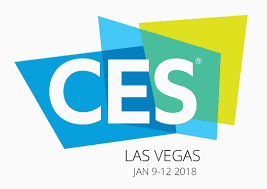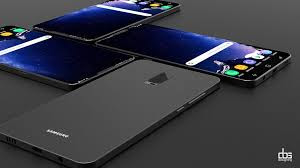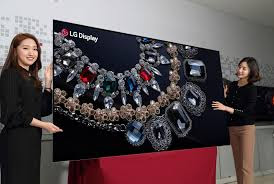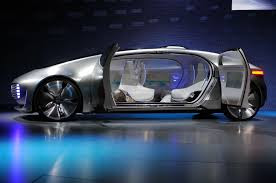CES 2018 is here and we’re all expecting over 4,000 companies with their different innovation to start arriving the Las Vegas gigantic annual tech fest. The Consumer Electronics Show is the event that kicks off the technology world's annual calendar, and 2018 will see thousands of companies descend upon Nevada to show off their gadgets.
Last year, CES recorded over 184,000 total attendance, 4,000 exhibiting companies, and 1,200 speakers. The trade fair helps startup companies and major tech companies show their capability and productivity. The event started with consumer gadgets but has now spread to the field of Artificial intelligence, marketing, automobile, medicine, agriculture and other fields.
Artificial Intelligence
Last year, the event experienced lots of Artificial Intelligence in consumable gadgets ranging from kitchen appliance to home appliances like fridges, televisions, and others. Last year LG implemented Alexa in its fridges and has announced that it is putting Google Assistant to its TVs. Other devices like cars, watches, and others are been turned to robots.
And this year, the search giant has booked a CES booth to show off its AI, as well as splurging on a new paint job for the Las Vegas monorail to promote it. While the battle to secure the most tie-ups will likely be intense, one trend to look out for is products that provide the best of both worlds.
GE has pre-announced a ceiling light that supports both companies' virtual assistants, and HTC already sells a smartphone that answers to both AIs' wake words. Image caption GE's Smart Ceiling Fixture has a built-in speaker and microphones to let it control both Alexa and the Google Assistant
We believe customer choice is important, and that multiple AIs can be complimentary of each other," an Amazon spokesman told the BBC. Elsewhere, expect AI-enhanced" to be the buzz phrase of the moment, even if it's not always clear what that means.
Personal Computing
There won't be millions of laptops launched at CES, but you can expect plenty of talk about the devices that are coming. The theme is likely to be low-power, super-efficient devices that can truly be described as having an "all-day battery" without lots of caveats. In December, HP and ASUS launched Snapdragon-powered Windows 10S laptops that can even be upgraded to the full-fat version of Windows. These devices will also come packing always-connected LTE modems, as the worlds of smartphones and laptops start becoming one. Intel, which is feeling the pinch from ARM chip makers like Qualcomm, will probably have something of its own to show off, even if it is just a concept device.
Mobile
If you're looking for the next blockbuster phone you want to buy, then CES probably isn't the show for you, since we've got Mobile World Congress coming up shortly afterward. For a brief second, there was a rumor that Samsung would shock everyone by announcing the Galaxy S9 at the show, but that was rapidly quashed. But what you can expect to see are plenty of budget handsets that will offer up features from last year's flagships at cheaper prices. Huawei's sub-brand Honor will be doing something at the show, and it's plausible that ZTE will do the same. Oh, and we'll keep our eyes peeled on Sony's corner because it's always turned up to CES with something nice in its back pocket.
Wearables
After a disastrous 2017, it's looking to be a quieter year for wearables since the industry has failed to convince mainstream users to buy smartphones for their wrists. It's possible that we'll see Android Wear devices from more fashion brands, especially since the Fossil Group produces timepieces for so many top-tier houses. If you're looking for big innovations in the smartwatch world, then you should probably gear yourself up for some disappointment.
Instead, it's entirely possible that we'll see wearable companies branch out further into the broader health and fitness world. Withings / Nokia Health already has a whole ecosystem products, from a sleep sensor, weighing scale and wireless thermostat to a smart hairbrush. Don't be surprised if other companies try and move in a similar direction in 2018, or even pivot toward the serious healthcare market.
Since the consumer-level watch world has slowed, many companies -- including Apple and Fitbit -- are looking to more serious projects. Both companies are running studies to examine if fitness trackers can detect heart conditions, and we've already seen others building blood glucose monitoring devices. We're on the lookout this year for plenty more of these, which will likely wind up being bought via your HMO.
Health
The so-called wellness market could prove to be CES' most vibrant sector this year.
One recent forecast suggested the world's annual healthcare spending will be nearly $9tn by the end of the decade. Both the big brands and start-ups believe there's an opportunity to disrupt a sector currently dominated by specialists.
Image caption ICI Vision is developing digital eyewear to help visually impaired people
Doubtless, not all the claims being made at CES will stand up to scrutiny, but it's heartening to see new tech trying to do something truly useful.
For example, Israel's ICI Vision is in town to promote a pair of prototype glasses designed to tackle blind spots caused by retinal diseases.
It is trying to combine small cameras, eye-tracking software and projection tech to direct views onto the healthy parts of the back of a patient's eye.
Image caption Samsung's Relumino glasses build on work the firm had been doing with its VR headset
Samsung is taking a different approach to visual impairments with Relumino - glasses that use a smartphone to process the wearer's view.
An app adds contrast, draws outlines and makes other colour changes to the view to make it clearer before floating the altered image into the eyewear's display.
Several firms are seeking to treat undesired behaviour via vibration-based "haptic" feedback.
Image caption The Snore Circle Eye Mask reacts to snoring sounds as well as collecting sleep data about its user
They include Keen - a smart bracelet that buzzes if it detects the wearer pulling their hair or picking their skin - and Snore Circle - an eye-mask that vibrates at different levels of intensity to nudge the owner into a different position if they make noises at night.
New parents also appear to be a favoured target for the latest health tech.
Stand-out launches include Me.Mum, a smartphone camera attachment whose maker claims it can detect mould-like particles in a woman's saliva that signal when she is at her most fertile.
Image caption Me.Mum aims to flag fertile days by spotting when the luteinising hormone is present in saliva
China's Tuoxiao will be demoing a smart stethoscope designed for use with infants that sends heart and lung readings to the cloud for analysis to determine if pneumonia might be present.
Meanwhile, two European start-ups are seeking to help women strengthen their pelvic floor muscles to combat bladder leaks caused by childbirth.
Fizimed's solution involves exercising with a force-sensing silicone device that provides feedback via an app.
Image caption Fizimed's Emy and Lifesense Group's Carin both aim to help women combat urine loss
Lifesense Group's offering centers on smart underwear that tracks the reduction of urine loss over time in order to motivate its owner to keep exercising.
Smart home
The surprise success of smart speakers has meant that the smart home and wider "internet-of-things" category is finally taking off.
Image caption Crownstone's plug adapters can be set to automatically turn a device on if it detects the owner is nearby
A flood of water use-tracking, temperature-adjusting, humidity-measuring, pollution-detecting gizmos will be on the show, as well as dozens of smart locks - even though consumers remain suspicious about letting apps control access to their homes.
There are, however, some participants seeking to break out from the crowd by taking a different approach.
Crownstone is promoting a system in which a home's lights and plug sockets automatically react to a resident's presence based on them having a Bluetooth-broadcasting wearable or smartphone on them, rather than waiting to be given a command.
Image caption Miliboo's connected sofa tracks its owners' TV-watching habits
Miliboo will be showing off a smart sofa that not only wirelessly charges your handset or tablet but also keeps track of how long you've been sat in front of the TV while monitoring your posture.
Smarter homes will also be pitched as being safer homes.
Several companies will show off fall-detectors to warn if elderly residents have taken a tumble, and a safe that sends a smartphone alert if it detects it has been tampered with will also debut.
Media captionWATCH: A British start-up will show off a new technology that lets houses hear burglars
But perhaps most the extreme system we've spotted so far comes from Cherry Labs.
The Silicon Valley-based firm uses cameras and audio sensors to keep track of which family members and pets are in which room at what time.
It then collates a twice-daily log of their activities for the person in charge.
Image caption Cherry Home is pitched as a way to provide "around-the-clock" safety to a family
On the flip side, if the idea of being put under surveillance makes you feel queasy, Cone of Silence promises to prevent your smart speakers being able to eavesdrop on you - accidentally or otherwise.
It works by generating a white noise signal specifically designed to overload the speakers' microphone arrays.
LG has already shown off an outsized 8K TV - with 16 times as many pixels as a 1080p "full HD" screen - ahead of CES.
Image caption LG's 8K OLED TV features 33 million self-emissive pixels
But with a distinct lack of content for the super hi-vision format available, expect the focus to remain on 4K for the time being.
Manufacturers may instead try to convince enthusiasts to upgrade by boosting the maximum brightness levels of their screens, which has the benefit of delivering superior high dynamic range (HDR) images. As a result, glints of sunlight off water can be more startling, and shadows can reveal more detail.
Several brands will likely add support for Samsung's HDR10+ standard, which is designed to prevent details in the brightest parts of the image being blown out on some screens - a problem the rival Dolby Vision format already tackles.
Image caption Amazon has already started to master some of its original programmes in the HDR10+ format
And some of the higher-end sets may also introduce support for the new HDMI 2.1 specification, which can handle higher data rates and potentially allow screens to be sent 4K video at up to 120 frames per second.
But the big question is whether Samsung will unveil a "micro-LED" TV.
The technology uses tiny components that emit their own light rather than relying on a backlight.
This allows micro-LEDs to deliver the kind of deep blacks currently restricted to the OLED displays that LG specializes in.
But micro-LEDs should also be capable of brighter output than OLED, making it a superior choice for HDR content.
Those with a good memory may recall that Sony showed off a Crystal LED TV in 2012 based on the same technology.
Image caption Sony showed off its version of a micro-LED TV six years ago but has only ever sold professional displays that feature the technology
That never went into mass production because it proved too expensive to make. We'll soon find out whether Samsung has found a way to keep costs down.
Traditionally, cars aren't considered consumer electronics, but as they get smarter and get electric motors, their justification for being at CES increases. Ford CEO Jim Hackett is the show's keynote speaker this year, and you can expect that a lot of mobility companies will be showing off their wares. And there's plenty to be excited about, with a whole raft of tech startups looking to supercharge the staid world of automotive engineering. We're expecting to see companies building new driver-safety AI systems, cheaper LIDAR sensors, and smart-charging devices. All of which will contribute to the infrastructure necessary to make electric, self-driving vehicles cheaper, faster and better.
Similarly, it won't just be electric skateboards that fill in the void around personal electric transportation at the show. We'll be looking out for electric scooters, self-balancing hoverboards, and other gear to help you get around cities faster. We already know that OjO is teaming up with Ford to produce a range of electric scooters, and would be certain that we'll find plenty more battery-powered transports at the show proper
CES is a grab bag of technology that is designed, by and large, to make our future better, so there's always room for a surprise. Honda has already revealed that it will be bringing a quartet of robots to the show -- including a smart wheelchair to help folks get around and an autonomous delivery robot. Last year saw a surge in companies offering next-generation WiFi gear, including ASUS, Norton, and Linksys. We'd expect to see plenty more to come, with a focus on keeping your Internet of Things devices secure, and ensuring your kids can't Google anything too erotic when you're not looking.
Away from the hardware front, we're expecting to see plenty of debate about how much political and social power technology companies currently hold. Many are anxious about what Silicon Valley can do, and has done, over the last few years, with blind optimism giving way to mistrust. Consequently, CES is playing host to several hand-wringing seminars where technologists debate the best way to move forward.
Some of this is playing out in the startups that are exhibiting at the show, a handful of which are looking to tackle online bullying and digital extremism. There will also be some talk about how technology companies can do better, although much of this talk will be for naught if the heavy hitters -- Facebook, Google, Microsoft, Amazon, and Twitter, amongst others -- aren't at the table.









No comments:
Post a Comment
Please drop your comments